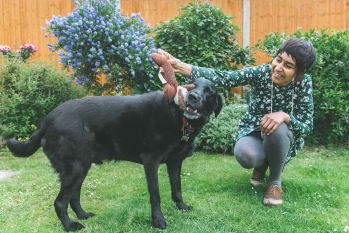Dogs for wellbeing

I am a huge fan of dogs. And for anyone who follows me on social media (@mahliaamatina), or my work more generally, will know that my dog (Jasper) is a big part of my life. As someone who struggles with anxiety, I often get lost in long thought-loops of unhelpful thinking patterns.
I have to feed and water my dog, give him his meds, ensure he is walked and goes outside for breaks. He offers unconditional love, reminds me to breath properly and helps me to relax. Not to mention the fact that he is devoted and provides me with reassurance, security and great companionship. I could very literally write multiple blogs about the benefits and joys of dog ownership alone.
If I’m working from home, I’m reminded to take regular screen breaks and have time to lighten up, be silly and play around with my dog. Because his needs are so simple and basic, this reminds me of the bigger picture and what’s really important when I’ve had an especially tough day. There are only a few things that truly matter in life, but you tend to forget that when lost in the abyss of your mind. For the scientific take, research has shown that even petting a dog can help lower blood pressure, heart rate, breathing and muscle tension. And I really see these benefits.
There are different schemes available if you would like to get an official autism assistance dog, and the benefits of this generally mean that they get to go to work with you, as well as other places like the supermarket, transport and public spaces more generally. The process does take time though, as there are a number of assessments conducted, and then the dog is trained specifically around what your individual support needs are.
I’ve heard incredible stories of assistance dogs and how they can provide deep pressure therapy when needed, the ways in which they help improve exercise and eating patterns, reduce the severity of meltdowns, as well as assisting with public transport
As my dog is getting older, I no longer take him into the office, as the journey and time away from his own environment would be too much for him now. However, I used to take him in to one of the offices I work at, and this helped not only me, but my colleagues also. Some of the plus points included:
1. Socialising: Having my dog in the office made socialising and connecting with colleagues that bit easier. Speaking about dogs, animals and colleagues’ pets more generally is one of my favourite topics, and if I can do that, then I’m happy, and more likely to be sociable and relaxed at work. It really boosted my confidence and helped me perform better at work.
2. Benefits to other colleagues: There was a real brightening and softening to the office whenever I took my dog in. He seemed to lighten the mood in my colleagues, and they appreciated the change. They could stroke and play with him, as well as join me on a walk. This meant that more breaks were being taken, which is great for clearing the mind and enabling the processing of information and ideas to take place. And brilliant for physical health also. I know on one occasion, we all ended up going out as a team, which was so nice for building team cohesiveness.
3. Increased productivity: With regular breaks, fresh air and physical exercise, comes an increase in productivity and performance more generally.
This lowers stress levels, which is a major contributor to absenteeism, low morale and burnout; I’ve always found that I’m less affected by these factors since having my dog in my life. I’d also emphasise that I only took my dog into the office sporadically, so if you were to regularly do this, then the effects are likely to be multiplied and more impactful.
There are some considerations to bear in mind when planning to take your dog into the office. These are generally more practical in nature, for instance thinking about where they will be situated, whether there is enough space for a blanket or basket, as well as ensuring that no one has any allergies or phobias towards dogs. I used to take my dog for a walk before coming into the office, so he would be in a calmer state when arriving. Naturally each dog is different, so you will have unique considerations for your own canine friend, but generally having a plan with your manager is a good idea.
Dogs at work bring so many benefits for autistic people, and all people in fact, which essentially feed into better employee satisfaction, engagement and performance overall. If there’s the option to take your dog into the office, I would strongly consider trialling it. If it’s not possible, and I appreciate there can be various reasons for this (I once co-shared an office with a colleague who had a dog allergy), I would explore options through official autism dog schemes, especially if you feel that a dog could be significant contributor in enabling stable long-term employment for you.


